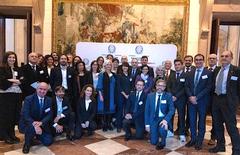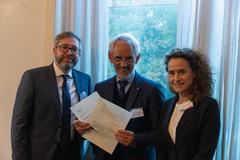URL: https://www.desy.de/news/news_search/index_eng.html
Breadcrumb Navigation
DESY News: SIGN: A new network for Italian scientists in Germany
News
News from the DESY research centre
SIGN: A new network for Italian scientists in Germany
Scientists from European XFEL and DESY have partnered with colleagues across Germany to form a new national network for Italian scientists: SIGN (for Scienziati Italiani in Germania Network). SIGN, the first network of its kind for Italian scientists working in Germany, aims to support research, providing opportunities for knowledge transfer and professional networking. Acting as co-founding members of SIGN, Sakura Pascarelli, Scientific Director at European XFEL, and Francesca Calegari, leading scientist at DESY and Professor of Physics at Universität Hamburg, signed the network’s founding charter at its inauguration event in Berlin on 12 October 2022.

The founding members of SIGN are fifty prominent Italian scientists active in Germany, of which more than 25 of them were present in Berlin. The event was opened by the Ambassador of Italy, H. E. Armando Varricchio, and of the President of the National Research Council, Maria Chiara Carrozza.

“Scientific cooperation is one of the pillars of the relationship between Italy and Germany,” says Varricchio, “and it can already count on the precious contribution of Italian researchers to German academia and research”.
“We are delighted to bring together the Italian scientific community across Germany,” adds Calegari. “This is the first step in strengthening our international collaboration, and building robust channels of exchange for ideas and information between our two nations.”
For more information, visits the SIGN website or follow their twitter profile: @SIGNnw



